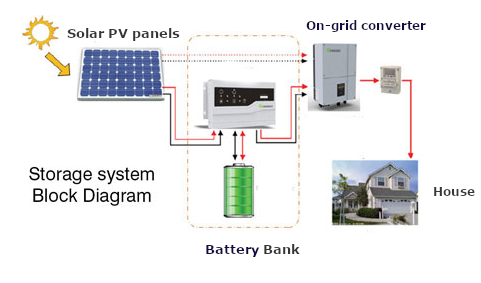Switch on to energy self-sufficiency, solar storage allows you store your solar power for when you need it most.
Combining battery storage reduces your dependence on the grid and decreases the money you put in the big six’s coffers!!
However, what should you consider when choosing storage?
Your alphabetical storage guide should help, please see our list below.
A. What’s the ‘useable’ capacity?
Capacity is the amount of energy in kWh (units) that a battery can store. Batteries ought never be depleted completely. However, some are untruthfully sold quoting ‘total’ capacity. Check what’s being stated. ‘Useable capacity’ is the figure you need to know. Though Tesla Powerwall is 14kWh, it’s sold as 13.5kWh, it’s useable capacity. It will never fully discharge to prevent damage to the battery cells.
B. What are ‘cycles (these are not a form of transport in the storage world)
A cycle is one full discharge and one full charge. It doesn’t happen like that. A battery may only discharge 25%, then recharge 25%. This would be 1/4 of a cycle. So, you need to know how many cycles a battery is warrantied for. Only then can you work out how many kWhs (units of electric) your battery will deliver over its warrantied lifetime.
C. What capacity do I need?
Like Solar PV, every home and its requirements differ. Are you looking to have an Electric vehicle? A larger battery can keep the house running and charge your EV overnight. Grid trading: larger battery capacity means more charging on cheap rate and more to sell back to the grid at peak rate.
D. What’s Charge/Discharge power?
Some battery storage systems only deliver 800w (watts) of power, useless if you want to boil a kettle (your kettle needs 2000 watts). Similarly, if you are generating 4kW but the battery can only take on 3kW then 1kW will be going to the grid, squandering your renewable energy. This means that you need to check the power output before you purchase, otherwise you may find yourself drawing a lot of energy from the grid even though you have energy in your battery.
E. What about power cuts?
General Storage systems are intended just for storage. However, some offer backup capability to provide power when there is a power cut (The Tesla Power Wall). Power outages are becoming more and more common, so you may want to consider a larger storage capacity to keep some power in reserve. If backup is crucial, let us know and we’ll design some tailored solutions for you to choose from.
Compare Solar Batteries
Use the table below to compare some of the battery systems available on the market. Prices are a guide only. They should be extremely near but check with us for latest info. Remember to add VAT. Currently, installing a battery with a Solar PV system attracts 20%VAT.
| Solar PV Battery Storage system | Charge /Discharge in kW | Storage capacity (kWh) | Useable capacity (kWh) | Cycles GTEE | Turn Key price | £/kWh of storage capacity | Powercut cover | AC/DC Coupled | |
| Tesla Powerwall | 5.0 | 13.5 | 13.5 | Unlimited | From £8607.00 | £577 | Included | AC | |
| Alpha Smile 14.5kWh | 3.0 | 14.5 | 13.92 | 2920 | From £5600 | £402 | No | AC | |
| Sonnen 9.43 – 15kWh | 3.3 | 15 | 13.5 | 10000 | From
£8835 |
£654 | Additional cost | AC | |
| Solax Hybrid X1 Triplepower 6.3kWh | 1.7 | 6.3 | 5.67 | 6000 | From
£4238 |
£747 | No | DC | |
| SolarEdge LG Chem RESU 10 | 5 | 9.8 | 9.3 | Unlimited | From
£6100 |
£655 | No | DC | |
| Powervault 3 – 12.3kWh | 3.3/5.5 | 12.3 | 12.3 | 6000 | From
£8090 |
£657 | No | AC | |
As you’ll see from the table above there are many storage solutions at varying prices. Checking the price/kWh of storage capacity is a fair and accurate way to compare different systems. What’s the right number of kWh for your property? That depends on you. The more kWhs you have, the more you can reduce your bills and take advantage of ‘Time of Use’ tariffs that are starting to emerge on the energy supply market. These allow charging on a cheap rate and selling back to the grid at higher rate periods. The greater the storage, the more you can sell.
Designed to function alongside your existing solar PV system or as part of a new combined home solar setup, battery storage will make it much easier to save on your electricity bills by allowing you to use more of the electricity converted by your panels.
During the day, excess power will charge your battery. Once you’re home from work the battery can then work its magic and discharge all of that clean energy. Your energy bills will be much lower and you’re doing your bit for the environment.
Want to add a battery to your existing solar system? Contact us for a quote today.

